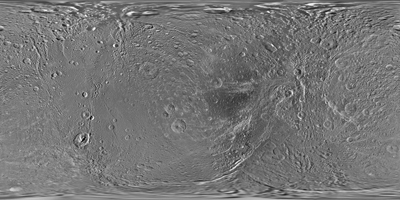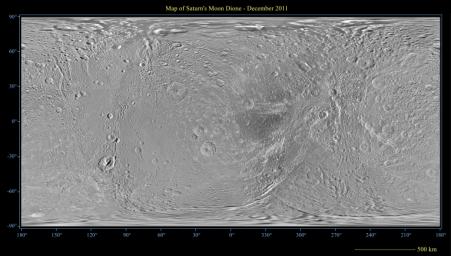
Unannotated Version (half size)
Click on the image for larger viewThis global map of Saturn's moon Dione was created using images taken during flybys by NASA's Cassini spacecraft.
An extensive system of bright ice cliffs created by tectonic fractures adorns the moon's trailing hemisphere, which is centered on 270 degrees west.
The map is a simple cylindrical (equidistant) projection and has a scale of 502 feet (153 meters) per pixel at the equator. The resolution of the map is 64 pixels per degree. The mean radius of Dione used for projection of this map is 350 miles (563 kilometers).
This map is an update to the version released in October 2010 (see PIA12814). This new map contains data from Cassini's Dec. 12, 2011, flyby of Dione. Improved coverage is in the area around 45 degrees north latitude, 210 degrees west longitude.
Like other recent Dione global maps, this map has been shifted west by 0.6 degrees of longitude, compared to the 2006 version of the map (PIA08341), in order to conform to the International Astronomical Union longitude system convention for Dione.
The full unannotated tiff version can be downlinked here PIA14914_full_2.tif. The full annotated tiff version PIA14914_full.tif. Photojournal note: these are large images and may be too large for some web browsers to handle. Users may right-click on the links to download the files to their desktop.
The Cassini-Huygens mission is a cooperative project of NASA, the European Space Agency and the Italian Space Agency. The Jet Propulsion Laboratory, a division of the California Institute of Technology in Pasadena, manages the mission for NASA's Science Mission Directorate, Washington, D.C. The Cassini orbiter and its two onboard cameras were designed, developed and assembled at JPL. The imaging operations center is based at the Space Science Institute in Boulder, Colo.
For more information about the Cassini-Huygens mission visit http://saturn.jpl.nasa.gov. The Cassini imaging team homepage is at http://ciclops.org.

 Planetary Data System
Planetary Data System













